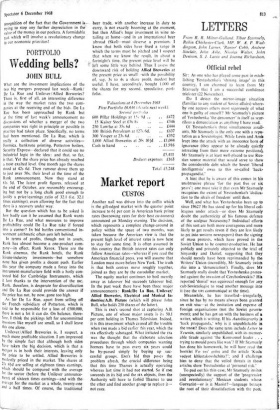Wedding bells?
PORTFOLIO JOHN BULL
What are the investment implications of the two big mergers proposed last week—Rank/ De La Rue and Unilever/ Allied Breweries? There is. first of all, an interesting difference in the way the market rates the two com- panies at the receiving end of the bids. De La Rue has been approached by Rank but at the time of last week's announcement no discussions of whether a merger of the two companies was right in principle or possible in practice had taken place. Specifically, no terms had been mentioned. De La Rue, which is really a collection of diverse activities— Formica, banknote printing, Potter ton boilers, Security Express—declared that it could see no industrial logic in the idea : and that, so far, is that. Yet the share price has already reached a most exalted level. One month ago the shares stood at 42s 6d. Then rumour drove them up to just over 50s, their level at the time of the Rank announcement. Now they stand at 61s 3d. The latest profit figures. released at the end of October, are reasonably encourag- ing but not by a long chalk good enough to justify a price/earnings ratio of 32.1 (i.e. 32.1 times earnings), even allowing for the fact that there is a recovery under way.
But the question which has to be asked is how badly can it be assumed that Rank wants De La Rue, and what measures to improve profitability could De La Rue take if forced into a corner? In bid battles conventional in- vestment arithmetic often gets left behind.
In terms of profits, though not in assets, Rank has almost become a one-product com- pany—in effect, Rank Xerox. There are the Rank cinemas, the Rank hotels, the Rank leisure-industry investments—but somehow none has given profits a decent push. Earlier this year the company made a foray into the instrument-manufacture field with a hotly con- tested bid for Cambridge Instruments, which it lost thanks to the intervention of the tac. Rank, therefore, is desperate for diversification and De La Rue could provide the answer if the price has not, by now, gone too high.
As for De La Rue, apart from selling off the French subsidiary of Potterton, which is said to be responsible for a loss of £500,000, there is not a lot it can do. On balance, there- fore. I think the pickings left for uncommitted investors like myself are small, so I shall leave this one alone.
Unilever/Allied Breweries is, I suspect, a much more profitable situation. I am impressed by the simple fact that although both sides have taken the big decision, which is that merger is in both their interests, leaving only the price to be settled, Allied Breweries is modestly priced in the market. The shares at 2Is 41d are selling at eighteen times earnings, Which should be compared with the average for the sector (before the Unilever announce- ment) of sixteen times earnings—and with the
-
average for the market as a whole, twenty-one and a half times. Of course, the traditional beer trade, with another increase in duty to carry, is not exactly booming at the moment, but then Allied's huge investment in wine re- tailing at home—and in an international beer abroad (Skop—must deserve a premium. I know that both sides have fixed a range in which the terms must be pitched and I suspect that when we know the result, in about a fortnight's time, the present price level will be left some little way behind. Thus I assess the downward risk of holding Allied Breweries at the present price as small--with the possibility of, say, 3s to 4s a share profit, modest but useful. I have, accordingly, bought 1.000 of the shares for my second, speculative, port- folio.
Valuations at 4 December 1968 First Portfolio £6,646 (details next week).
Second pm.tf,,lio 600 Pillar Holdings at 15, 9d £472 15 Kaiser Steel at £36 8s • • .. £546 250 Lonrho at 35s 6d £444 100 British Petroleum at I27s 6d. .. /637 300 Vosper at 23s 6d. £352 1.000 Allied Breweries at 20s 10-14 .. £1,044 Cash in hand .. .. £1,916 £5,411
Deduct: expenses £163
Total £5,248


































 Previous page
Previous page